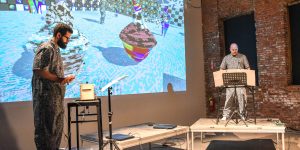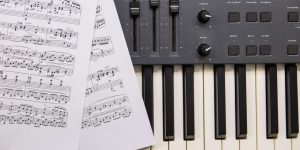Hackathon

ORCHIDEA with Composer and Lead Researcher at CNMAT
Carmine Cella
Carmine Cella is available to host a live online demonstration/workshop for ORCHIDEA, a framework for static and dynamic computer-assisted music orchestration. Orchestration consists largely of choosing combinations of sounds, instruments, and timbres that support the narrative of a piece of music. The ORCHIDEA project assists composers during the orchestration process by automatically searching for the best combinations of orchestral sounds to match a target sound, after embedding it in a high-dimensional feature space.

Can we do the same with less - AI in 64 Kb
Philippe Esling (FR)
This hands-on workshop for the AIxMusic Hackathon by Philippe Esling (FR) introduces techniques for lightweight AI, demonstration of embedded technologies and a 64 Kb competition for an AIxMusic hackathon project challenging the current limits of AI and inspired by the Demoscene and the 64Kb competitions.

Jugend hackt remote: digital gardening
Jugend hackt Austria (AT), c3 (HU), mb21 (DE), ArtechLAB (NL), Ars Electronica (AT)
We present the outcome of Jugend hackt remote: digital gardening, which is a hackathon for young people from 12 to 18 years. It took place during August 29th and was inviting young coders from Austria, Germany, Hungary and the Netherlands

Ars Electronica AIxMusic Online Hackathon
Philippe Esling (FR), Lamtharn Hanoi Hantrakul (TH), Carmine Cella(IT), Edward Tiong (US) and Yishuang Chen (US)
For the occasion of the first online Festival, Ars Electronica will host its first international AIx Music Hackathon as part of the AIxMusic Festival 2020. The hackathon will take place online during the Ars Electronica Festival from 9-13 September 2020. Join our workshops and engage with other hackers, develop prototypes that musicians will be able to integrate, stimulate the use of open data and public resources!

BR41N.IO Hackathon - The Brain-Computer Interface Designers Hackathon
The BR41N.IO Hackathon brings together programmers, engineers, designers, artists and/or enthusiasts, who collaborate intensively as an interdisciplinary team. Each team must design and build a unique, playful and wearable headpiece that can measure useful EEG signals in real-time to create any sort of interaction. The hacking projects use EEG electrodes and amplifiers, and challenge programmers to code an interface that enables them to control devices, robots or applications, post messages on social media, make paintings, or enact a myriad of other applications only with their thoughts. BR41N.IO also challenges creative minds to design a BCI headset with 3D printers, handcrafted materials and sewing machines.


